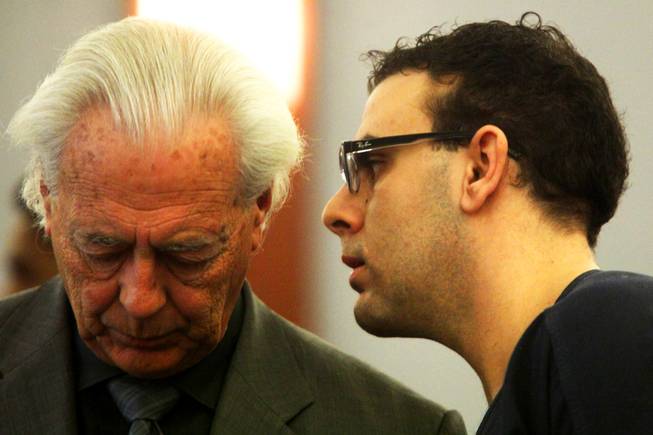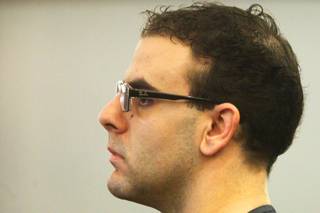
Anthony M. Carleo talks with his attorney, William Terry, during a hearing Friday, April 8, 2001.
Published Friday, April 8, 2011 | 9:29 a.m.
Updated Friday, April 8, 2011 | 10:58 a.m.
Sun archives
- Doctor expected to testify at hearing of accused Bellagio casino robber (4-1-2011)
- Confidential informant to testify at Bellagio robbery hearing (3-9-2011)
- Hearing suspended until next month in Bellagio robbery case (2-23-2011)
- Hearing set for alleged Bellagio ‘Biker Bandit’ (2-7-2011)
- Man has chance encounter on Internet with alleged 'Biker Bandit' (2-4-2011)
- Metro Police arrest judge’s son in Bellagio casino robbery (2-3-2011)
- After Bellagio heist, how slack security can cost Las Vegas casinos (1-11-2011)
- Bellagio nixing $25,000 chip after heist (12-29-2010)
- Bellagio bandit gets $1.5 million in gambling chips (12-14-2010)
Anthony Carleo, accused of being the "biker bandit" who robbed the Bellagio in December, will have his first appearance in Clark County District Court later this month.
Las Vegas Justice Court Judge Ann Zimmerman ruled Friday there was enough evidence against Carleo to send the case to district court and she set Carleo's arraignment for 10:30 a.m. April 21.
Carleo, 29, the son of Las Vegas Municipal Court Judge George Assad, is being charged with seven felony counts.
Zimmerman told Carleo she had found there was probable cause on the following counts: burglary while in possession of a deadly weapon, carrying a concealed firearm or other deadly weapon, robbery with the use of a deadly weapon against a victim 60 years of age or older, three counts of robbery with the use of a deadly weapon and assault with a deadly weapon.
Carleo is accused of being the same man caught on a surveillance camera who walked into the casino about 3:50 a.m. Dec. 14, 2010, wearing a motorcycle helmet. The man then went to a craps table and took about $1.4 million in casino chips, then ran out of the casino, got on a motorcycle and drove away, according to witness testimony.
Carleo, who is still in custody on $1 million bail at the Clark County Detention Center, was in court Friday morning as his attorney, William Terry, made final arguments in the preliminary hearing.
The hearing had been delayed since February so Terry could meet with a confidential police informant and decide whether to bring him in to testify.
However, Terry told the judge Friday morning he tried to make contact with the witness, Kian Kaveh, and therefore had been unable to have him served with a subpoena. Terry said he thought Kaveh had gone to California to avoid testifying.
"It was fairly apparent to us that he was avoiding service of the subpoena," Terry said.
Terry said prosecutors had a duty to keep track of the informant. Terry also indicated he would address that issue at the district court level. Although Kaveh was represented as being a doctor, there is no evidence of that through the local medical association, Terry said.
Terry had said he wanted to put Kaveh on the stand to see if there were any discrepancies between what Kaveh said and what an undercover Las Vegas police detective, Michael Gennaro, had testified concerning what took place at meetings Kaveh had set up between Gennaro and Carleo.
The undercover police officer testified that he had five meetings with Carleo arranged by an informant from Jan. 28 through Feb. 2 at the Venetian and the Bellagio.
All together, the officer said he purchased a total of seven $25,000 chips from Carleo in their transactions. After officers arrested Carleo, they also got another seven $25,000 chips, the undercover officer said. Those chips were valued at $350,000, he said.
During his final arguments, Terry said he wanted to dismiss one of the counts, assault with a deadly weapon, on Lillian Graczyk, a Bellagio security officer.
"If the court recalls her testimony, she did not indicate any type of fear situation," Terry said.
Chief Deputy District Attorney Chris Owens agreed to dropping that charge and Zimmerman dismissed it.
Terry also moved to dismiss all the felony counts involving firearms, saying that the state never produced a weapon and did not prove that a real gun, rather than a replica or a pellet gun, was actually used in the robbery.
"You heard testimony in reference to an item being carried by the individual. But there was no specific proof that that was firearm that met the definitions of ability to fire a projectile," Terry said.
Owens said that Terry's argument that a firearm needed to be produced was in conflict with other case law in Nevada, which says the state is not actually required to produce the weapon, but a description by a witness is sufficient.
Owens said in this case, the description by the witnesses is that it appeared to be a real gun, and for purposes of establishing probable cause, that was sufficient.
The judge agreed with Owens and let the charges involving firearms stand.


Join the Discussion:
Check this out for a full explanation of our conversion to the LiveFyre commenting system and instructions on how to sign up for an account.
Full comments policy